Mapping Flock cameras, police 'secrecy' varies by department

Mapping Flock cameras
Flock Safety says one of the hallmarks of its surveillance technology is transparency, but when FOX6 Investigators asked for public records disclosing camera locations in 20 Wisconsin cities, we found the responses were all over the map.
Milwaukee - Forty-thousand automated license plate recognition (ALPR) cameras are tracking drivers across the United States. Some police departments want to keep their locations secret.
Flock Safety says one of the hallmarks of its surveillance technology is transparency, but when FOX6 Investigators asked for public records disclosing camera locations in 20 Wisconsin cities, we found the responses were all over the map. The first police chief we talked to about Flock cameras is Jeff Caponera in Grafton, one of the first to bring Flock technology to Wisconsin.
"Those cameras are not capturing anything the naked eye wouldn’t see walking down the street," Caponera said in an interview earlier this year.
Over the past six years, Flock Safety has deployed more than 40,000 license plate reading cameras in more than 3,000 cities throughout the U.S.
"The mission of flock is to eliminate crime as a community," said Amy Cornell, Flock's Community Affairs Manager, at a public information meeting in Oconomowoc in September.
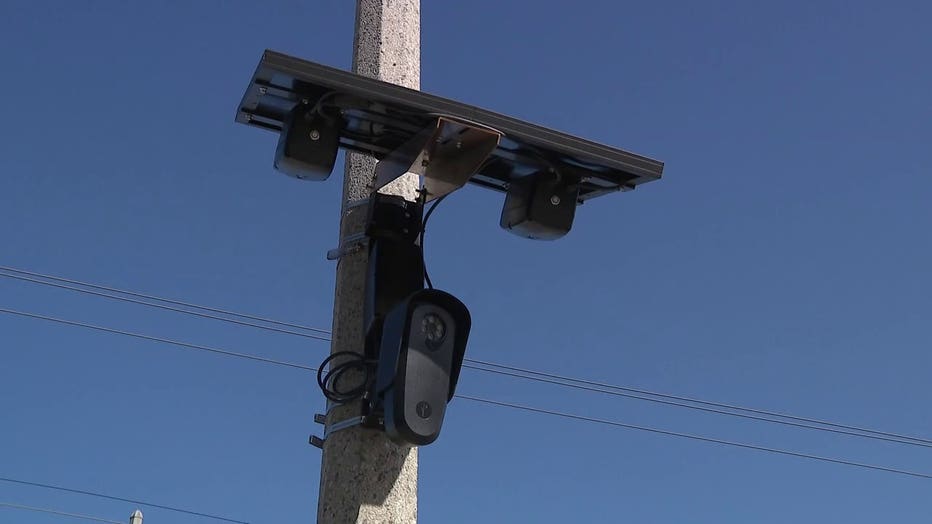
As the company's cameras spread rapidly throughout the Badger State, Cornell emphasized their commitment to keeping the public informed about what their system does and does not do.
"Transparency is of utmost importance to Flock," Cornell said.
Flock's solar-powered cameras use artificial intelligence to detect the make, model and color of every car that passes by, along with other identifying features, like bumper stickers or roof racks. That data is instantly compared to lists of stolen or suspect cars, including those from the National Crime Information Center, which is updated in the Flock system at least four times a day.
But what sets Flock apart from other systems is what happens to the data after a car passes by. The camera sends that information over cellular networks to cloud-based servers accessible to police departments across the country. That data is saved for thirty days in a searchable, nationwide database.
For Charles Schellpeper, that presents a conundrum.
SIGN UP TODAY: Get daily headlines, breaking news emails from FOX6 News
"I want to catch criminals in our community," Schellpeper said after a Flock presentation to the Oconomowoc City Council in June. "I want to catch people that are going to hurt people. That have hurt people. I don’t want to catch every innocent person’s traffic pattern."
Schellpeper says he supports local police, but does not necessarily have the same level of trust for state and federal officials. In early October, he was one of four Oconomowoc City Council members who voted against Police Chief James Pfister's plan to install Flock cameras. Four others voted in favor. The mayor broke the tie, approving the plan.
"I don’t think it matters what side of the aisle you’re on on this one," Schellpeper said. "There’s reasons to have concerns."
Police call the cameras a game-changer. The ACLU calls it "mass surveillance." FOX6 Investigators just wanted to know where the cameras are.
"Oh yeah, when we decide what those locations are, we’ll put that out there," Pfister said. "We've got nothin’ to hide."
In April, FOX6 Investigators asked the 20 largest police departments in southeastern Wisconsin for their Flock camera locations.
So far, nine have released the records, including Mequon, Germantown, Menomonee Falls, Waukesha, West Allis, Greenfield, Oak Creek, Mount Pleasant and Pleasant Prairie.
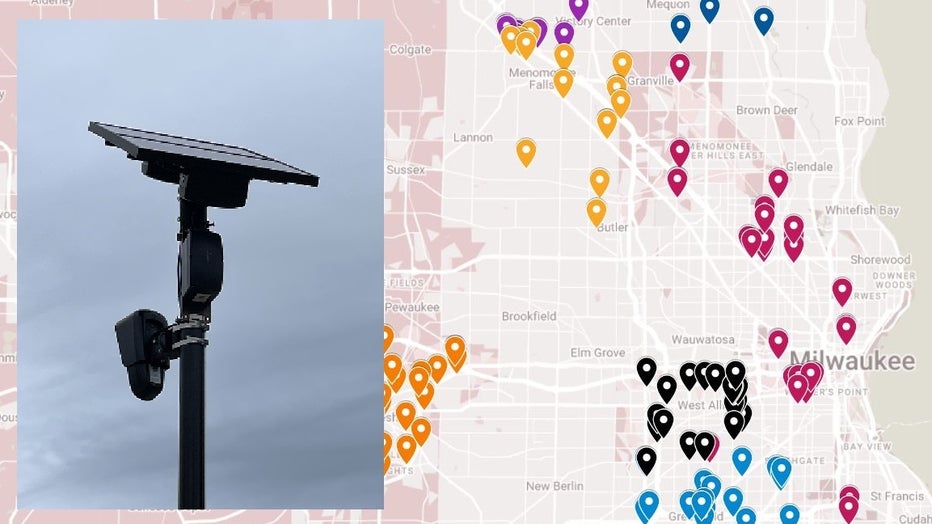
You can view the maps of those communities' Flock cameras by following this link to Known Flock Cameras SE Wisconsin.
"We’re not trying to hide, you know, where they are," said Lt. David Daily, Waukesha Police Department. "They’re not concealed."
"They’re not hidden cameras," said West Allis Deputy Chief of Police Robert Fletcher.

Interactive map of Flock cameras
FOX6 Investigators have used Google Maps to chart out locations of known Flock cameras.
Racine and Kenosha police have yet to fulfill the request six months later. (Racine has released hundreds of pages of records, but is in the process of redacting more than 700 others.)
Five others refused to give out camera locations, at least initially.
Franklin police said doing so would "reveal crime detection techniques." Brookfield said it could give "a strategic advantage" to criminals. New Berlin said "secrecy" is required. Wauwatosa said there's "negligible public interest" in camera locations. And Milwaukee Police said disclosure could "seriously impair" their ability to fight crime.
FREE DOWNLOAD: Get breaking news alerts in the FOX6 News app for iOS or Android.
In fact, they didn't just decline our request for the records. All five declined to explain why in an on camera interview.
"What’s transparent about that?" asked FOX6 Investigator Bryan Polcyn.
"Nothing," answered Tom Kamenick, an open records attorney and founder of the Wisconsin Transparency Project.
"I think there’s a whole lot of, ‘You have to just trust us.’" he said.
Kamenick says public oversight is important and there's no evidence publishing camera locations will render them ineffective.
"We have plenty of places around the state and around the country that let the public know where these cameras are. It’s not causing those kinds of problems," he said.
FOX6 tried to talk to Wauwatosa Police Chief James MacGillis about it before a public meeting.
"Why don’t you want to talk about where these cameras are located?" Polcyn asked.
"I don’t appreciate being approached this way," the chief replied.
We even told him we were coming.
"I didn’t want to approach you this way," Polcyn said. "I asked for a sit down interview and you declined."
"I did decline," MacGillis said.
"Why?" Polcyn asked.
"Because I'm a busy person. I have a police department to run," MacGillis said.
Milwaukee Police told me they’re "not required" to do interviews. Three days later, the department's public information officer came to FOX6 for a different story.
"I just want to know if we can ask you a few questions about Flock cameras," Polcyn said, approaching Sergeant Efrain Cornejo in the FOX6 parking lot.
"No, I came here for this," Cornejo replied.
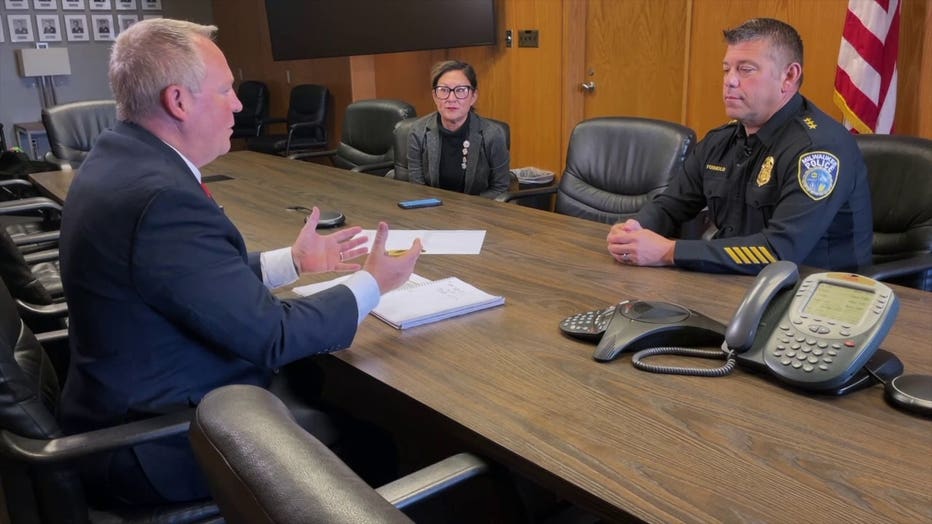
FOX6 Investigator Bryan Polcyn interviews Milwaukee Assistant Police Chief Paul Formolo, as MPD Chief of Staff Heather Hough looks on.
Polcyn followed Cornejo through the parking lot asking more questions when Cornejo turned to face him.
"For operational purposes, we don’t disclose locations. OK?" Cornejo said.
"Do you feel like this is being transparent with the public about how these cameras are being used?" Polcyn asked.
"Thank you, Bryan," the sergeant said, before turning around and walking away again.
Next, we tried to speak to Milwaukee Police Chief Jeffrey Norman after an unrelated news conference, but Norman walked away too. Instead, his Chief of Staff, Heather Hough stepped in.
"I understand you have been trying to ambush a lot of people," Hough said.
"No, no, no," Polcyn replied. "I've been trying to sit down and do an interview."
Eventually, Hough arranged for FOX6 to sit down with Assistant Police Chief Paul Formolo. But even then, the department filtered his responses.
"I sense a reluctance by police, by Milwaukee Police, to want to talk about this. Why is that?" Polcyn asked.
"I’m going to interject on this one," Hough said.
"First question?" Polcyn asked.
"Yup, first question," Hough replied.
When Formolo did answer, he said they're not using Flock for live surveillance, but to help detectives after a crime has been committed.
Case and point, a red Nissan Altima, captured on video surveillance near the scene of a drive-by shooting in September. The video shows the car had bare rims on three wheels, but a distinctive cover on the left rear wheel.
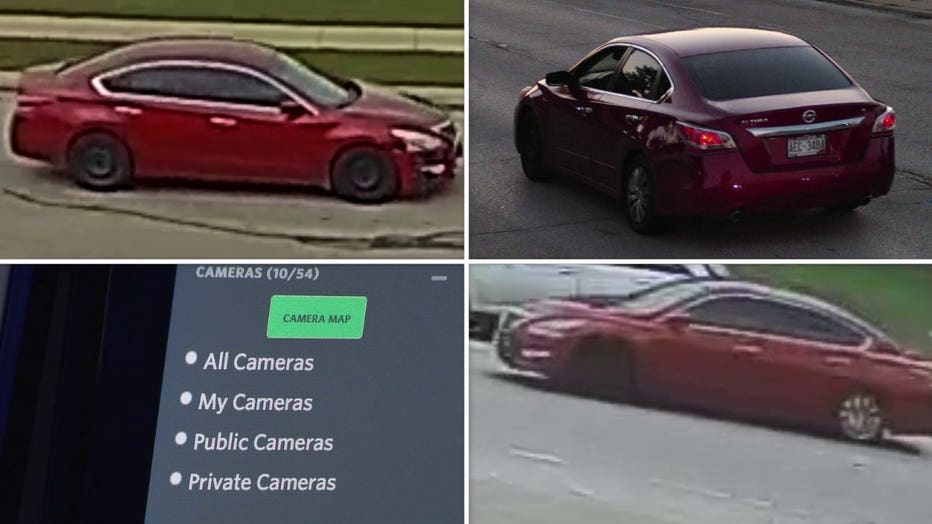
A Flock camera elsewhere in the city captured the same car, but gave police something they didn't have before – a license plate number. That led to arrests and felony charges against two men.
"I can assure the community that we’re not actively using this technology to spy on people or track them without a purpose," Formolo said.
But when it comes to revealing the specific locations, he said they're worried criminals will use that information to target the cameras or dodge them.
"We have a fear or concern that this equipment could be stolen or vandalized, and it’d be very expensive to replace," he said. "We’re not hiding anything from anybody. We’re just not comfortable disclosing the exact locations of these devices."
And that makes what happened next the biggest surprise of all. After the interview, Milwaukee police gave us a list of intersections. They told us they were the "general" areas where Flock cameras are located.
We drove to each one and found the actual Flock cameras mounted to streetlights or standalone poles within one or two blocks of each intersection. In other words, MPD led us to all 29 of their Flock cameras after all.
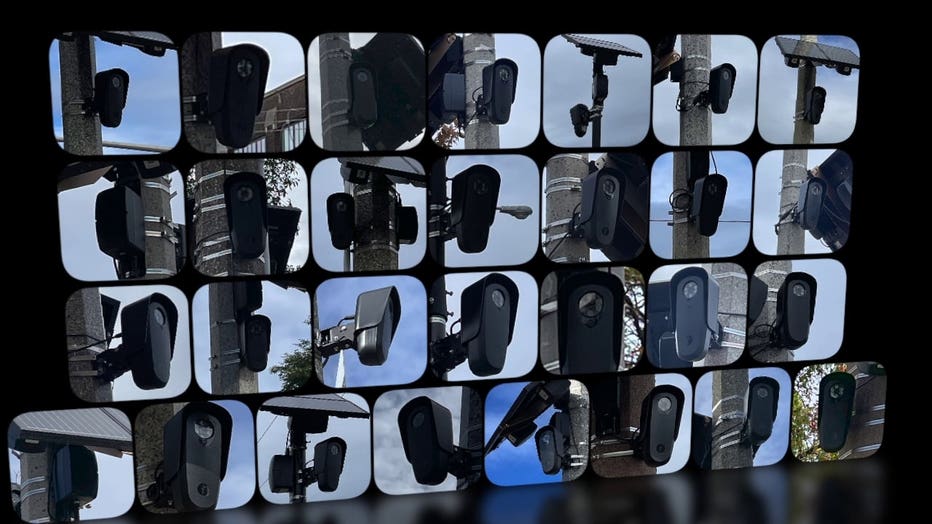
We wondered, did they really mean to? In an email, the department says it was "intended," but they declined to provide any further explanation.
Back in the suburbs, Alderman Schellpeper is not convinced his community should install the cameras at all.
"Just because it’s right for Elm Grove or Milwaukee doesn’t mean it’s right for Oconomowoc," he said.
Oconomowoc has approved four Flock cameras in concept, but a final vote on the city budget won't take place until Nov. 21.
Milwaukee has 29 Flock cameras in place with a few more on the way. In addition, MPD has 39 license plate readers from another company called Genetec. Assistant Chief Formolo says the Genetec cameras do not feed into a database that's shared with other agencies, like Flock does.
After our original Flock story in August, a FOX6 viewer in Beaver Dam requested a map of Flock cameras in his community. Police declined to release the locations, writing that doing so would "undermine their effectiveness."
That viewer hired Attorney Kamenick to write a letter on his behalf. After that, Beaver Dam Police released a detailed map of their eleven Flock cameras.
We invite you to see all the Flock cameras we have mapped so far.

